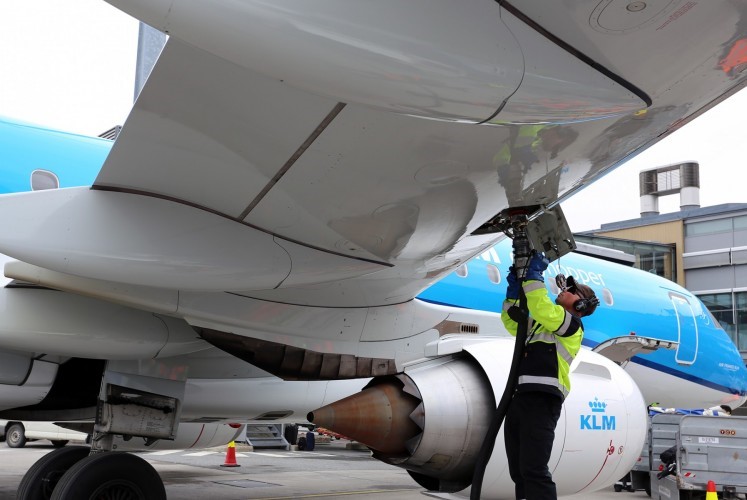First Embraer initiative to gauge the efficiency of biofuel in comparison with kerosene on regular flights
Amstelveen, March 31, 2016: KLM Royal Dutch Airlines today launched a series of around 80 biofuel flights from Oslo to Amsterdam operated with an Embraer 190. The remaining flights will be operated over the forthcoming period of five to six weeks, marking yet another step in the right direction towards making aviation more sustainable. Embraer will be conducting measurements during these flights to gauge the efficiency of biofuel in comparison with kerosene.
The flights will depart from Oslo Airport (Avinor), the first airport to supply biofuel directly from its hydrant system since January this year. In addition to biofuel supplied from the hydrant system, biofuel will also be delivered by separate fuel trucks for the series of flights operated by KLM Cityhopper. Biofuel has to be supplied by fuel trucks for these flights in order to measure the efficiency of biofuel in comparison with kerosene during the Embraer flights.
Boet Kreiken, Managing Director KLM Cityhopper: “KLM believes that sustainable biofuel is important for the airline industry. For this reason, we have for some time been cooperating with different partners, including those united within the scope of the ‘KLM Corporate BioFuel Programme’, to stimulate the development of the market. Our new cooperative relationship with Embraer and Oslo Airport (Avinor) serves to underscore just how important this is.”
Jorge Ramos, president Embraer Europe: “Embraer has been directly involved in several initiatives and partnerships for research and development of biofuels for aviation, but these flights with KLM are a flagship, as they represent the first initiative Embraer develops with aviation biofuels on regular flights. We will use the biofuel flights from Oslo to Amsterdam operated by the E190 to gather data to assess the performance of the engines using a percentage of jet biofuel in comparison with fossil-based kerosene.”
Inmaculada Gomez, ITAKA coordinator said: “The biofuel batch for these flights was initiated by ITAKA (Initiative Towards SustAinable Kerosene for Aviation) and funded by the European Commission. With KLMs flights with biofuel from Amsterdam to Aruba and Bonaire (May 2014), KLM is our launching customer. We are happy to go on with our partnership in the Oslo-Amsterdam series of flights which will bring the commercialization of alternative energy sources for air travel one step closer”
The biofuel for this series of flights is produced from 100% RSB (Roundtable on Sustainable Biomaterials) certified camelina oil and in full compliance with the EU RED standard. The biofuel is produced within the ITAKA project and supplied by Air BP and SkyNRG. The ITAKA consortium was founded by leading companies operating in the airline and fuel industries. Together, they are working on producing and testing sustainable biofuel in the airline industry. In achieving this goal, they receive financial support from the European Commission.
The biofuel flights are partly funded by the partners in the KLM Corporate BioFuel Programme: ABN AMRO, Accenture, CBRE Global Investors, FMO, FrieslandCampina, City of Amsterdam, Heineken, Loyens & Loeff, PGGM, Perfetti Van Melle and the Schiphol Group.
KLM’s aim is to reduce CO2 emissions by 20% per passenger in 2020 (compared to 2011 levels) through fleet renewal, using sustainable biofuel and increasing flight efficiency. Because affordable sustainable biofuel is not always available, KLM also aims to stimulate the market for sustainable biofuel. KLM is “best in class” when it comes to fuel efficiency and leads the field with respect to using sustainable biofuel.
KLM’s recent inclusion of the E175 from Embraer in its fleet ties in with the airline’s aim to further reduce CO2 emissions. This aircraft type is significantly more fuel-efficient in comparison with the current Fokker 70 equipment, and is therefore more environmentally friendly. Using 18% less fuel, it also generates an 18% reduction in CO2 emissions.

KLM’s aim is to reduce CO2 emissions by 20% per passenger in 2020 (compared to 2011 levels) through fleet renewal, using sustainable biofuel and increasing flight efficiency
KLM’s recent inclusion of the E175 from Embraer in its fleet ties in with the airline’s aim to further reduce CO2 emissions. This aircraft type is significantly more fuel-efficient in comparison with the current Fokker 70 equipment, and is therefore more environmentally friendly. Using 18% less fuel, it also generates an 18% reduction in CO2 emissions.
Source: KLM
